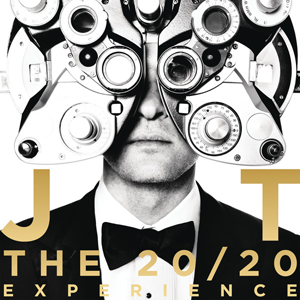
Revisited: The 20/20 Experience
I spend a disproportionate amount of my time listening to albums that the rest of the world stopped talking about years ago. That’s partly because I am convinced music peaked over a decade ago, partly because I can’t be bothered to pay attention to “new” music, but mostly it’s because I genuinely enjoy the process – I listen to some artists over and over, and discover songs that have aged well, aged poorly, or mean something completely new to me than they did when I first heard them. These revisits have always been a nostalgic reminder of where I was at the time I first heard this music, what this music meant to me, and how I’ve grown in the years since, so much so that I decided to build a column around them. This is Revisited.

With all of that in mind, I wanted to kick off this series with a two-part revisit to an album that defined a major transitionary period in my life. As I moved from high school to college, it was the album that hung over my first date, first prom, graduation, and first time away from home. Fittingly, it is also an album that represents a serious moment of maturation for its artist, as he moved from being a raucous and braggadocious pop star to the elegant and sophisticated “President of Pop.” Of course, this album is Justin Timberlake’s expansive two-part The 20/20 Experience, the best-selling album of 2013, and perhaps the most ambitious album of his career.
Part one of The 20/20 Experience is bright, sophisticated, and – in stark contrast to Timberlake’s earlier work – puts special emphasis on instrumental breaks. The record carries Timberlake’s strong falsetto vocals in a classic, Marvin Gaye-like funk/R&B fashion, and it’s lengthy arrangements convey an appreciation for instrumentation that’s seldom found in modern pop music. Indeed, its expansive instrumentation, emphasis on production and long runtime makes it more akin to the work of Elton John or Daft Punk’s Random Access Memories than Timberlake’s 2010s pop contemporaries. It possesses a lushness and moodiness that is atypical for popular music of its era, and frankly any era – its pop viewed through an R & B lens.
Experience opens with strings building up to a full orchestral reveal, announcing to the world a new urbane, suit-clad, clean-cut, and mature Justin Timberlake. It’s a brilliant moment, and sets the tone for the entire album to follow. The opening piece is “Pusher Love Girl” – an extended metaphor of a song that compares a woman’s love to the addictive power of drugs. While not exactly an original conceit (and that will be a theme of this album, it’s more homage more than innovation), it introduces us to the idea that Timberlake is very much in love, enjoys expressing his feelings openly, and hopes that we’re having as much of a good time as he is.
As the album proceeds past better-known hits like ‘Suit & Tie”, we venture further into a production-heavy middle. The seven-minute-plus, Bollywood-inspired “Don’t Hold the Wall”, almost painfully-bright (and a guilty-pleasure happy-go-lucky-feeling song of mine) “Strawberry Bubblegum”, and annoyingly-repetitive “Tunnel Vision” illuminate well produced arrangements (if not great songwriting). They do drag to their discredit, but their length gives you time to fully understand how much Timberlake has developed as an artist. The album then reaches one of its weirdest points in the Bowie-esque “Spaceship Coupe” – Justin Timberlake really wants to have sex on the moon, and needs you to know all about it – but comes back home with the warm, earnest slow jam “That Girl.” This is part of where this album shines, because it demonstrates that Timberlake is no longer determined to “Rock Your Body”, bring sexy back, or sing about his heartbreak, because God damn it he is in love and he’s happy. Contrasted against the FutureSex/LoveSounds’s “My Love”, it depicts an intimacy rather than an attraction, a real feeling of appreciation and sentimentality over raw lust and sex-appeal, relying on a slow groove and upbeat horns rather than the seductive synths of “My Love”. It’s one of the better examples of Timberlake’s progression towards maturity, away from his provocative-if-catchy youth, to a more contemporary beat on how much he adores his new wife.In case you’ve missed the Internet in the last decade, it’s Jessica Biel. Jessica Biel is his wife.
The album begins to build to its climax with “Let the Groove Get In”, an underrated (but also seven-plus-minute) jam that gets you moving and tapping along with him just before the emotional climax of the album’s breakaway hit, and the song I’m sure you’ve all been waiting to hear about, “Mirrors.”
“Mirrors” has always worked for me better live than on the album, because as its opening notes carry, the entire audience erupts in such genuine joy – as if they believed he had forgotten it in his set list, and Timberlake gives a smile as if to express his deep appreciation for their continued love before launching into the powerful opening lyrics. “Aren’t you something to admire?” he asks, “‘cause your shine is something like a mirror,” he tells. Building to the chorus, the anticipation doesn’t need to linger, “‘Cause I don’t wanna lose you now, I’m looking right at the other half of me,” an almost raw admission of a timeless love.
It’s the “My Love”-equivalent we’ve been waiting for on the album, if not quite hitting the brevity and righteous beat “My Love” exudes, but it works. “Mirrors” last half, whose extended instrumentals were tragically cut short in the single’s radio edit, contains some of the most sentimental moments on the album as it descends and deconstructs to a simple beat and harmony. In it’s wistfulness, it’s some of Timberlake’s best work.
At Experience’s conclusion, Timberlake retreats to “Blue Ocean Floor”, a dreamy piece that inspires little more than a lull back to sleep – to rest your eyes, and end the journey a bit softer and more at ease than before. This is oddly alluring on re-listen, and provides a much-needed rest before the darker, more aggressive, and edgier The 20/20 Experience: Part Two.
Best Song
“Pusher Love Girl”. Its orchestral build-up, delivery, and Timberlake’s cunning, affluent vocals swinging right out of the gate make for a hell of an introduction to the next hour you’ll be spending with the new stunning and sophisticated Mr. Timberlake. It’s eight-minute runtime falls starkly above even this album’s seven-minute runtime average, but it never grows tired.
Worst Song
“Blue Ocean Floor” takes this spot, because even deep within “Spaceship Coupe” are some redeemable moments, but “Blue Ocean Floor” never works alone. It only really works as a wind down to the entire album, and it does so inoffensively, but doesn’t contribute much of anything on its own, which is something that had not occurred to me until I started to put this album into words.
Most Underappreciated Song
“Pusher Love Girl” wins here as well, and is actually the only song from this Grammy-nominated album to have won its non-video award (for Best R&B Song).“Suit & Tie” was also nominated for Best Music Video and did win that; “Mirrors” was nominated for Best Pop Solo Performance, “Suit & Tie” was nominated for Best Pop Duo/Group Performance, and the album itself was nominated for “Best Pop Vocal Album” It has aged well, despite not being a single and falling by the wayside compared to “Mirrors” or “Suit & Tie”. While “Let the Groove Get In” is a good time and also deserves a mention, its staccato and worn-out motif make it hard to justify its over seven minute length.
Most Overrated Song
“Suit & Tie”, yeah I said it – this song never did it for me and it still doesn’t. It fits with the album, and it’s okay, but it has never been a song I’ve ever been excited to hear outside of a full-album listen.
Worst Moment
There’s a moment about four-to-five minutes into “Blue Ocean Floor” when Timberlake’s voice, for like the fourth time, really accentuates that “if my red eeeeeeyyeeeeees don’t see you anymore,” and then there’s still like two more minutes left in the song! If any part of this album is insistent and overdone it’s this, because it goes from dreamy to abruptly high-pitched, taking you out of your pleasant relaxation as the album concludes.
Best Moment
Those opening moments of “Mirrors” take me back to hearing the song on the radio every ten minutes in high school, and pack a heavy nostalgic punch; but the point I think really takes the cake is after the final chorus of the song – as Timberlake winds down. It’s the moment where he said farewell in his live performances, when people are crying, so moved by his passion and his hard-earned rise to the top of their hearts in that moment. It’s a humbling, human, regression from the height of the album – and it’s a profoundly sad moment, knowing it will never be the same again and that 2013 is long, long gone. But, for a brief look into what it felt like to be young in that moment, and to feel that way for a brief minute once more, there is no more perfect moment in Timberlake’s catalogue.